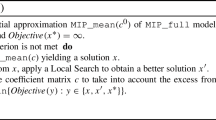Abstract
In the periodic event scheduling problem, periodically reoccurring events need to be scheduled, subject to constraints on the resulting time differences. A typical application for this type of problem relates to train schedules, which have to repeat every hour for passenger convenience. As external disruptions may occur, robustness considerations need to be included in the scheduling process. In this work, we present a recovery approach for instances where integer programming methods can be applied, and a bi-criteria local search algorithm for large-scale instances. In computational experiments, we compare solutions calculated using the recovery approach to risk-averse and to risk-oblivious solutions. Our results suggest that the solutions generated by our approach have a favorable trade-off between cost and robustness. Furthermore, we compare the local search algorithm to a simplified approach that includes the desired robustness level as a hard constraint. The experiments show that our algorithm finds an improved set of non-dominated solutions within equal computation times.






Similar content being viewed by others
Explore related subjects
Discover the latest articles, news and stories from top researchers in related subjects.Notes
The instance is available for download as part of the PESPlib benchmark set under http://num.math.uni-goettingen.de/~m.goerigk/pesplib/.
References
Ben-Tal A, Nemirovski A (1998) Robust convex optimization. Math Oper Res 23(4):769–805
Cacchiani V, Caprara A, Fischetti M (2012) A lagrangian heuristic for robustness, with an application to train timetabling. Transport Sci 46(1):124–133
Cacchiani V, Caprara A, Toth P (2010) Non-cyclic train timetabling and comparability graphs. Oper Res Lett 38:179–184
Cacchiani V, Caprara A, Toth P (2010) Scheduling extra freight trains on railway networks. Transp Res B 44B(2):215–231
Cacchiani V, Toth P (2012) Nominal and robust train timetabling problems. EJOR 219(3):727–737
Caimi G, Fuchsberger M, Laumanns M, Schüpbach K (2011) Periodic railway timetabling with event flexibility. Networks 57(1):3–18
Caprara A, Fischetti M, Toth P (2002) Modeling and solving the train timetabling problem. Oper Res 50(5):851–861
Kroon L et al (2009) The new dutch timetable: The OR revolution. Interfaces 39:6–17
Fischetti M, Monaci M (2009) Light robustness. In: Robust and online large-scale optimization, vol 5868 of LNCS, Springer, pp 61–84
Fischetti M, Salvagnin D, Zanette A (2009) Fast approaches to improve the robustness of a railway timetable. Trans Sci 43:321–335
Goerigk M, Schachtebeck M, Schöbel A (2014) LinTim—Integrated optimization in public transportation. Homepage. see http://lintim.math.uni-goettingen.de/
Goerigk M, Schachtebeck M, Schöbel A (2013) Evaluating line concepts using travel times and robustness. Publ Transport 5(3):267–284
Goerigk M, Schöbel A (2010) An empirical analysis of robustness concepts for timetabling. Proceedings of ATMOS10, vol 14 of OpenAccess Series in Informatics (OASIcs) Dagstuhl, Germany, pp 100–113
Goerigk M, Schöbel A (2013) Algorithm engineering in robust optimization. Technical report, Preprint-Reihe, Institut für Numerische und Angewandte Mathematik, Universität Göttingen (Submitted)
Goerigk M, Schöbel A (2013) Improving the modulo simplex algorithm for large-scale periodic timetabling. Comp Oper Res 40(5):1363–1370
Goerigk M, Schöbel A (2014) Recovery-to-optimality: A new two-stage approach to robustness with an application to aperiodic timetabling. Comp Oper Res 52(Part A(0)):1–15
Gurobi Optimization Inc., Gurobi optimizer, 2012. Version 5.0.
Isaai MT, Singh MG (2000) An object-oriented, constraint-based heuristic for a class of passenger-train scheduling problems. IEEE Trans Syst Man Cybern C Appl Rev 30(1):12–21
Kroon L, Dekker R, Vromans M (2007) Cyclic railway timetabling: a stochastic optimization approach. Algorithmic Methods for Railway Optimization, vol 4359 of LNCS, Springer, Berlin/Heidelberg, pp 41–66
Liebchen C (2008) The first optimized railway timetable in practice. Trans Sci 42(4):420–435
Liebchen C, Lübbecke M, Möhring RH, Stiller S (2009) The concept of recoverable robustness, linear programming recovery, and railway applications. In: Robust and online large-scale optimization, vol 5868 of LNCS, Springer, pp 1–27
Liebchen C, Möhring R (2007) The modeling power of the periodic event scheduling problem: railway timetables—and beyond. In: Algorithmic methods for railway optimization, vol 4359 of LNCS, Springer, pp 3–40
Liebchen C, Proksch M, Wagner FH (2008) Performances of algorithms for periodic timetable optimization. In: Computer-aided systems in public transport, Springer, Heidelberg, pp 151–180
Nachtigall K (1998) Periodic Network Optimization and Fixed Interval Timetables. Habilitationsschrift, Deutsches Zentrum für Luft- und Raumfahrt Braunschweig
Nachtigall K, Opitz J (2008) Solving periodic timetable optimisation problems by modulo simplex calculations. In Proc, ATMOS
Odijk M (1996) A constraint generation algorithm for the construction of periodic railway timetables. Trans Res B 30:455–464
Oliveira ES (2001) Solving single-track railway scheduling problem using constraint programming. PhD thesis, University of Leeds
Peeters L (2003) Cyclic railway timetable optimization. PhD thesis, Erasmus University of Rotterdam
Serafini P, Ukovich W (1989) A mathematical model for periodic scheduling problems. SIAM J Disc Math,pp 550–581
Siebert M, Goerigk M (2013) An experimental comparison of periodic timetabling models. Comp Oper Res 40(10):2251–2259
Acknowledgments
I would like to thank the anonymous referees for their great effort in improving the quality of this paper.
Author information
Authors and Affiliations
Corresponding author
Additional information
Partially supported by grant SCHO 1140/3-1 within the DFG programme Algorithm Engineering.
Appendix: Decomposition of RecOpt-PTT
Appendix: Decomposition of RecOpt-PTT
The following lemma is given in Goerigk and Schöbel (2014).
Lemma 1
Let \(x^1, \ldots , x^N\in \mathbb {R}^n\) be optimal solutions to the scenarios \(\xi ^1,\ldots ,\xi ^N\) and let \(x^*\) be the solution of a location problem (Loc) that is of one of the following forms:
-
1.
\(loc(x)= \sum _{i=1}^N d^2(x^i,x)\), where \(d^2\) is the squared Euclidean distance.
-
2.
\(loc(x)= \sum _{i=1}^N d(x^i,x)\), where \(d\) is linear equivalent to the Euclidean distance.
-
3.
\(loc(x)= \max _{i=1}^N d(x^i,x)\), where \(d\) is linear equivalent to the Euclidean distance.
-
4.
\(loc(x)= \sum _{i=1}^N d(x^i,x)\), where \(d\) is any \(l_p\)-norm for \(1 < p < \infty \) and \(n=2\).
Let \(Q(x^i) \le \delta \), \(i=1,\ldots ,N\), for some convex function \(Q:\mathbb {R}^n \rightarrow \mathbb {R}\), \(\delta \in \mathbb {R}\). Then
Definition 1
Let \(P\) be an optimization problem, and let \((\mathcal {X}_1,\mathcal {X}_2)\) be a partition of the problem variables. Let \(\mathcal {F}\) be the set of feasible solutions for \(P\). We call \(P\) combinable with respect to the variables \(\mathcal {X}_1\), if
for all \(x_1 \in \mathrm{conv} \{x^1_1, \ldots , x^N_1\}\) and every set of feasible solutions \(\{(x^1_1,x^1_2), \ldots ,(x^N_1,x^N_2)\}\) to \(P\).
Theorem 1
Let \((P(\xi ),\xi \in \mathcal {U})\) be an uncertain optimization problem with finite uncertainty, and let \(P(\hat{\xi })\) be combinable with respect to the variables \(\mathcal {X}_1\). Let \(\mathcal {F}(\xi ) \subseteq \mathcal {F}(\hat{\xi })\) for all \(\xi \in \mathcal {U}\). Let \(d\) be a metric of any of the types from Lemma 1 that only depends on the variables \(\mathcal {X}_1\). Then there is a solution to (RecOpt) that is feasible for the nominal scenario.
Proof
Let \(\{x^1,\ldots ,x^N\}\) be optimal solutions to the scenarios \(\{\xi ^1,\ldots ,\xi ^N\}\), respectively. Let \((x_1^*, x_2^*)\in \mathcal {X}_1\times \mathcal {X}_2\) be an optimal solution to the location problem (Loc). Due to Lemma 1, we have \(x_1^* \in \mathrm{conv}\{x^1_1, \ldots , x^N_1\}\).
As \(P\) is combinable, there is an \(x_2'\) such that \((x_1^*,x_2')\) is feasible for the nominal problem. As \(d\) does not depend on the variables in \(\mathcal {X}_1\), \((x_1^*,x_2')\) has the same objective value for (Loc) as \((x_1^*, x_2^*)\), which completes the proof.
We conclude that in the case of periodic timetabling, we can separately solve every scenario, solve an unconstrained location problem, and find an optimal solution to (RecOpt-PTT):
Corollary 1
If there is a unique optimal solution to every scenario, (RecOpt-PTT) with respect to a metric equivalent to \(l_2\), or \(l_2^2\) considering only activities from \(\mathcal {A}_{drive} \cup \mathcal {A}_{wait}\) can be solved to optimality by solving \(N\) periodic timetabling problems, and one unconstrained location problem.
Rights and permissions
About this article
Cite this article
Goerigk, M. Exact and heuristic approaches to the robust periodic event scheduling problem. Public Transp 7, 101–119 (2015). https://doi.org/10.1007/s12469-014-0100-5
Published:
Issue Date:
DOI: https://doi.org/10.1007/s12469-014-0100-5




